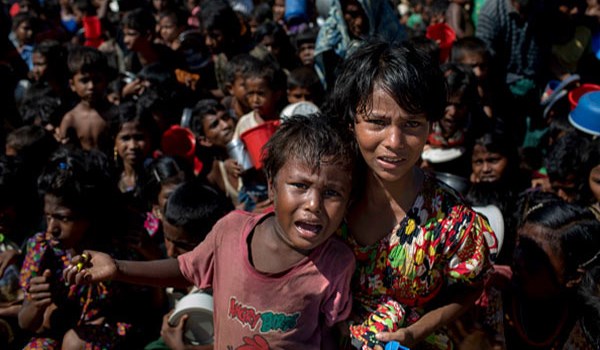
RNA - The four rights groups, Amnesty International, Human Rights Watch, the Global Center for the Responsibility to Protect and Fortify Rights, made the request a week after a team of UN Security Council envoys concluded a visit to Myanmar and Bangladesh, presstv reported.
The council team met Rohingya in Bangladesh for the first time to hear the sufferings of some 700,000 Muslim refugees, who have escaped a campaign of violence, rape and arson by Myanmar’s military, which began some nine months ago.
Associate director of international justice at Human Rights Watch Param-Preet Singh said now that the Security Council “has heard directly from Rohingya refugees about the horrors inflicted by Myanmar’s Army, the need to hold those responsible to account should be clear.”
“Myanmar’s repeated and implausible denials of responsibility for atrocities and its longstanding culture of impunity mean that the International Criminal Court is the only real hope for victims to see justice,” she stated.
"Time and again Myanmar authorities have shown themselves to be completely unwilling to even acknowledge the crimes… let alone take steps to bring those responsible to book," she stressed, adding that "the clock is ticking to act."
Head of the Asia-based group Fortify Rights Matthew Smith said the ICC should also investigate "mounting evidence" of genocide against Rohingya Muslims.
He stated the organization has gathered dozens of names of alleged perpetrators that go "straight to the top within the Myanmar armed forces."
Genocide is known as the “crime of crimes.”
The United Nations defines the term as acts committed with intent to destroy a particular group under a convention signed decades ago.
The UN human rights chief Zeid Ra’ad al-Hussein once vowed that those behind the atrocities against the Rohingya people would face genocide charges in court in the future.
Myanmar's military has been committing killings, making arbitrary arrests, and carrying out mass arson attacks to destroy houses in predominantly-Rohingya villages in Rakhine.
According to Fars News Agancy, the country’s de facto Leader Aung San Suu Kyi, who consistently denied the allegations, told the council members that if evidence of violations was provided to her, the Myanmar authorities would undertake a “proper investigation”, according to Britain's Ambassador to the United Nations Karen Pierce.
Myanmar's government has long been provided with evidence by Human Rights Watch and other international monitors. The government had for years refused to allow UN investigators to enter Rakhine.
The Nobel Peace Prize winner Suu Kyi is under pressure by the international community for failing to use her position to prevent crimes against the Rohingya.
847/940